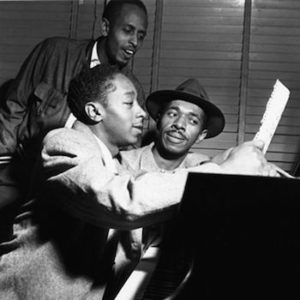
Elmo Hope
*Elmo Hope was born on this date in 1923. He was a Black jazz pianist, composer, and arranger.
He was born St. Elmo Sylvester Hope in New York City. His parents, Simon and Gertrude Hope, were immigrants from the Caribbean and had several children. Elmo began playing the piano at age seven; he had classical music lessons as a child and won solo piano recital contests in 1938. Fellow pianist Bud Powell was a childhood friend, and together, they played and listened to jazz and classical music. Hope attended Benjamin Franklin High School, known for its music program.
He developed an excellent understanding of harmony and composed jazz and classical pieces at school. Hope survived being shot by police as a teenager to become a New York-based musician who recorded with several emerging stars in the early to mid-1950s, including trumpeter Clifford Brown and saxophonists John Coltrane, Lou Donaldson, Jackie McLean, and Sonny Rollins. A long-term heroin user, Hope had his license to perform in New York's clubs withdrawn after a drug conviction, so he moved to Los Angeles in 1957. He was unhappy during his four years on the West Coast, but had successful collaborations there, including with saxophonist Harold Land.
More recordings as a leader ensued following Hope's return to New York, but they did little to gain him public or critical attention. Further drug and health problems reduced how often he made public performances, which ended a year before his death at the age of 43.
He remains little known, despite or because of the individuality of his playing and composing, which were complex and stressed subtlety and variation rather than the virtuosity predominant in bebop. Hope, Powell, and Thelonious Monk were considered by their contemporaries to be influenced by each other early in their careers, and all, therefore, helped affect the development of jazz piano. Powell was known for horn-like right-hand playing supported by simple left-hand chords, which he had worked on with Hope.
Later pianists who cited Hope as a significant influence included Lafayette Gilchrist, Alexander Hawkins, Frank Hewitt, and Hassan Ibn Ali. Hawkins said in 2013 that Hope was important because he had a highly individual style but did not have the iconic status of pianists such as Monk. Modern jazz guitarist Kurt Rosenwinkel has mentioned Hope's rhythms, phrasing, and compositions as influences. His wife, Bertha Hope, has released albums dedicated to her former husband's compositions.
She and her later husband, bassist Walter Booker, created a band named "Elmollenium" in 1999, which played Elmo's compositions. She transcribed recordings to recreate his arrangements following an apartment fire that destroyed most of the original manuscripts. In September 2016, Lyman Place in the Bronx was co-named "Elmo Hope Way Jazz Pioneer" in honor of the pianist. Several critics have advocated for a reassessment of Hope's career.
One writer for Down Beat in 1980 wrote on Hope and fellow pianist Herbie Nichols: "They were practically categorized out of existence. Dismissed as second-stringers and copyists when they were both prolifically creative and highly original, they suffered a neglect that is only now beginning to be dispelled in the case of Nichols, and that still continues in the case of Hope." In 2010, The Penguin Jazz Guide observed, "Like many of his piano generation, [... Hope's work is only now being properly studied and appreciated."
Pianist Hasaan Ibn Ali said of Hope, "He was one of the foremost great ones to offer such a large dose for the sickness of music. Upon his ideals and knowing that help was needed, he gave to his companions Thelonious Monk, Bud Powell, and many others. During this time, so much was being produced and brought forth by the musicians, but he was still the actual cause." Tenor saxophonist Johnny Griffin called Hope "the real genius of the piano."
Elmo Hope, chiefly in the bebop and hard bop genres, died on May 19, 1967.